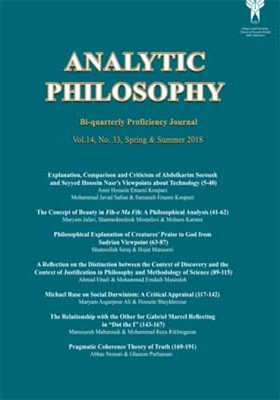-
-
List of Articles
-
Open Access Article
1 - Explanation, Comparison and Criticism of Abdolkarim Soroush and Seyyed Hossein Nasr′s Viewpoints about Technology
-
Open Access Article
2 - The Concept of Beauty in Fih-e Ma Fih: A Philosophical Analysis
-
Open Access Article
3 - Philosophical Explanation of Creatures’ Praise to God from Sadrian Viewpoint
-
Open Access Article
4 - A Reflection on the Distinction between the Context of Discovery and the Context of Justification in Philosophy and Methodology of Science
-
Open Access Article
5 - Michael Ruse on Social Darwinism: A Critical Appraisal
-
Open Access Article
6 - The Relationship with the Other for Gabriel Marcel Reflecting in "Dot the I"
-
Open Access Article
7 - Pragmatic Coherence Theory of Truth
-
The rights to this website are owned by the Raimag Press Management System.
Copyright © 2021-2025







